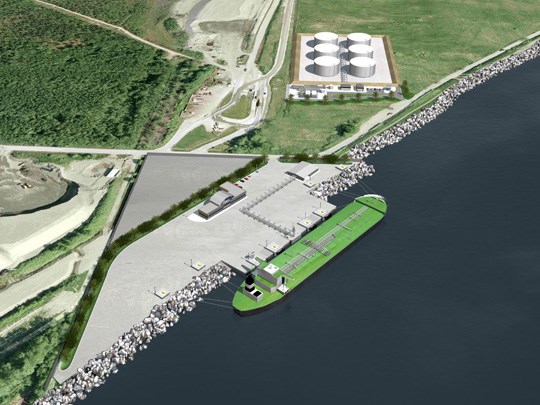Delta hasn't come out with a position on the controversial plan to build a jet fuel storage tank farm along the Fraser River, but comments by the mayor at last week's Delta council meeting seemed to indicate which way the municipality is leaning.
"I have to continue to say that from the outset that Delta has 35 round trips of very large tankers going down our freeway and I would be very happy and do support the elimination of those trucks going through the North Delta area," Lois Jackson said at the Sept. 14 meeting.
The mayor was the only council member to comment on a staff report updating the civic politicians on the planned $93 million fuel delivery system to Vancouver International Airport.
Owned by a consortium of airlines that use YVR, the Vancouver Airport Fuel Facilities Corporation (VAFFC) wants to ship jet fuel up the Fraser River to a tank farm that would be built on an industrial site on the Richmond side on the south arm of the river. An underground pipeline would then send the fuel to the airport.
In December 2013, the province announced that a conditional environmental assessment certificate would be issued. The decision was made after a review led by the B.C.
Environmental Assessment Office.
The project has faced heated opposition from the City of Richmond and many residents there, while some in Delta have also voiced concerns.
Challenging the fuel corporation and Port Metro Vancouver's public consultation process, Vancouver Airport Project Opposition for Richmond (VAPOR) sought a judicial review, but lost that case in courts earlier this year.
The latest Delta staff report noted the application, which must still undergo permitting processes and reviews by other agencies, includes a commitment to review the final spill response plan with Delta and prepare and implement a fire safety plan in consultation with the local fire department.
According to the proponent, the project's benefits include removing 1,000 tanker trucks per month from B.C.'s roads, thereby eliminating the existing risks of fuel spills from those trucks.
A previous Delta staff report noted the existing pipeline meets approximately 80 per cent of the aviation fuel demand at YVR. The remainder is delivered by up to 35 tanker truck round trips per day that travel through Delta. Current growth in fuel demand is being met by increasing those tanker truck deliveries.
Delta's environment committee had already noted "the benefit of removing the existing jet fuel tanker trucks from Delta's highways that will result from this project and the associated reduction in risk to the citizens and environment."
Although Delta hasn't come out with a position opposing the project, unlike Richmond, the municipality has conveyed a number of concerns, including asking that a spill preparedness and response plan be completed. Delta also submitted that it does not have the responsibility or capacity to respond to spills or fires resulting from the project.
The fuel corporation held an open house last Thursday in Richmond, a session VAPOR's Otto Langer urged citizens to attend to send the message "that the transport of such highly toxic and flammable products into the Fraser River and its storage on the banks of the river near a high density housing and recreational complex is a high risk for the river, its wildlife and fisheries, and the people and property of Richmond and Delta."



